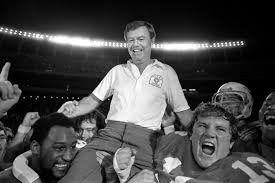Darrell Royal is a name that resonates deeply within the annals of college football history, particularly for fans of the Texas Longhorns and aficionados of the sport as a whole. Revered not only for his impressive coaching record but also for his lasting impact on the game, Royal stands as one of the greatest icons in college football. His journey from a young athlete in the heart of Texas to becoming a legendary figure who transformed the Longhorns into a powerhouse program is a story of dedication, innovation, and unwavering leadership.
Born on July 6, 1924, in Hollis, Oklahoma, Darrell K Royal’s early years set the stage for a life steeped in football excellence. Growing up in Texas, he quickly developed a passion for the game, which would ultimately define his professional career. Royal’s own playing days were marked by versatility and tenacity. He played college football at the University of Oklahoma as a quarterback and defensive back, showing early signs of the leadership and strategic mind that would later define his coaching style. His football acumen was evident even then, and after a stint in the military during World War II, Royal transitioned to a career in coaching, where his impact would be far greater.
Royal’s coaching career began modestly, with assistant coaching roles at various colleges, but it was his hiring as the head coach of the University of Washington in 1956 that first put him in the spotlight. Although his tenure there was brief, it was enough to demonstrate his potential as a transformative leader. However, it was his return to Texas in 1957 as the head coach of the Texas Longhorns that truly marked the beginning of a legendary era. Royal took over a program that had experienced ups and downs and immediately set about building a culture of discipline, hard work, and innovative football.
Throughout his 20 years at Texas from 1957 to 1976, Royal crafted a dynasty that would become synonymous with college football excellence. His teams won three national championships—in 1963, 1969, and 1970—cementing Texas’s position as a dominant force in the sport. These championship seasons were not merely the product of talented rosters but also the result of Royal’s meticulous preparation and groundbreaking strategies. He was a pioneer in offensive innovation, famously perfecting the wishbone offense, a run-heavy scheme that revolutionized college football offenses in the late 1960s and early 1970s. The wishbone offense leveraged speed, deception, and a triple-option attack that left opposing defenses scrambling and struggling to keep up.
Royal’s success was not limited to offensive innovation alone. His emphasis on physical conditioning, mental toughness, and team cohesion created a program that was disciplined and resilient. Players who came through his system often praised his ability to motivate and develop talent, not just on the field but as individuals. Royal was known for treating his players like family, instilling values of loyalty, integrity, and responsibility. This holistic approach to coaching helped forge teams that were greater than the sum of their parts and prepared young men for success beyond football.
The impact of Royal’s coaching extended well beyond the gridiron. His leadership during a time of social change in the United States included progressive steps towards integration in college sports. While the South was slow to integrate, Royal’s Texas teams eventually became inclusive, breaking barriers and setting an example for others. This demonstrated that Royal’s vision for Texas football was not just about winning games but also about shaping the future of college athletics and society at large.
Royal’s coaching record speaks volumes about his legacy. He amassed 184 wins, 60 losses, and 5 ties during his tenure at Texas, making him the winningest coach in Longhorns history. His 1969 team, in particular, is remembered as one of the greatest in college football history, finishing undefeated and capturing the national title in a dramatic Cotton Bowl victory over Arkansas, a game immortalized as the “Game of the Century.” Royal’s ability to inspire his team to perform at their peak in high-pressure situations is a hallmark of his coaching genius.
Beyond his coaching accomplishments, Royal’s influence shaped the entire college football landscape. His innovations forced other programs to adapt and evolve, pushing the sport forward. The wishbone offense, although less common today, laid the groundwork for many modern option offenses and remains a fundamental part of football history. Royal’s coaching philosophy—combining tactical ingenuity with strong character building—became a model emulated by coaches nationwide.
Royal’s contributions to football did not go unrecognized. He was inducted into the College Football Hall of Fame in 1983, a testament to his extraordinary career and impact on the sport. His name is synonymous with the University of Texas, where the stadium is now officially named Darrell K Royal–Texas Memorial Stadium in his honor, a permanent tribute to a man whose life and work transformed Texas football forever.
After retiring from coaching in 1976, Royal continued to serve the University of Texas as athletic director, overseeing other sports programs and contributing to the broader athletic department’s success. His influence extended into administrative roles where his leadership and vision helped elevate the university’s athletic prestige.
Royal’s personality off the field was marked by humility and a deep commitment to his community. He was known for his folksy wisdom, sharp wit, and approachable demeanor, qualities that endeared him to fans, players, and fellow coaches alike. His leadership style was not authoritarian but based on respect, understanding, and a genuine desire to help young men grow into responsible adults. This approach fostered loyalty and respect that lasted long after his coaching career ended.
Throughout his life, Royal remained an ambassador for college football and Texas Longhorns athletics. His legacy is carried forward by generations of coaches and players who draw inspiration from his teachings and accomplishments. His impact is not only measured in wins and championships but also in the character and lives he helped shape. The values of perseverance, innovation, and integrity that he championed continue to influence the sport.
In reflection, Darrell Royal’s story is one of passion, innovation, and leadership that transcended the boundaries of a football field. He was a visionary who understood that success in sports was as much about mental and emotional strength as it was about physical talent. His pioneering spirit changed how football was played, coached, and appreciated. More than that, he built a culture of excellence that endures at the University of Texas and in the broader world of college football.
Darrell Royal’s name will forever be etched in the pantheon of college football greats. He is remembered not just as a coach who won games and titles but as a transformative figure who elevated the sport and left an indelible mark on Texas and American football culture. His legacy continues to inspire, reminding us all that greatness comes from a blend of innovation, dedication, and unwavering commitment to one’s principles. The story of Darrell Royal is truly the story of a legend, a coach, and an icon whose influence will be felt for generations to come.



